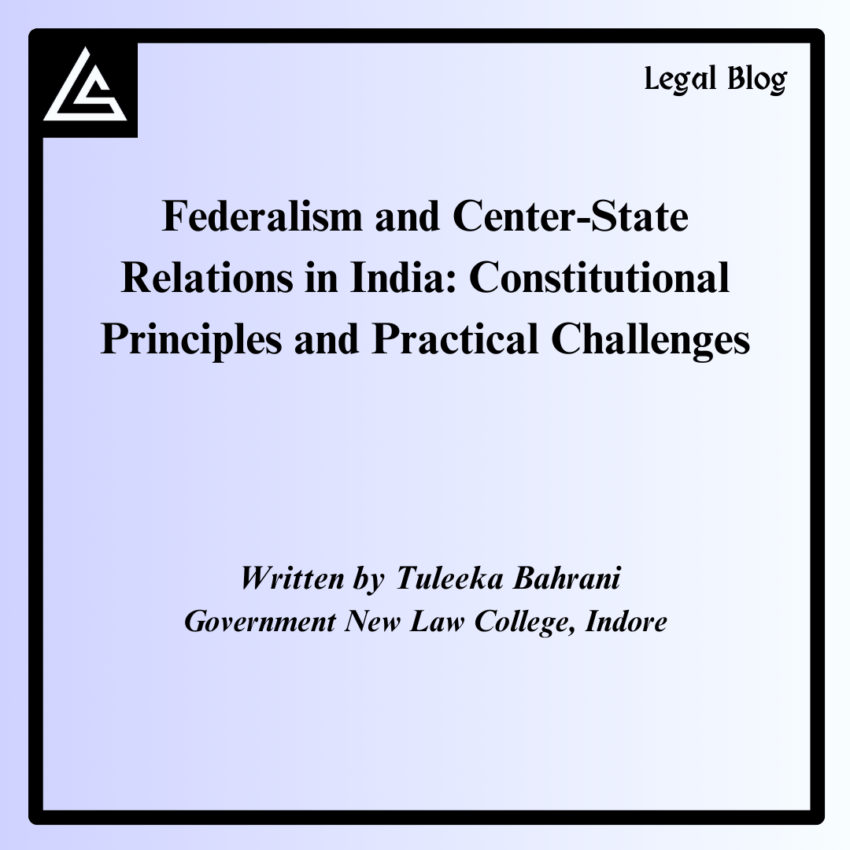Table of Contents
Introduction
Indian Constitution, being a blend of unitary and federal elements, divides all powers between center and state, as the division of power between the center and the state is the main feature of federalism. The Constitution of India establishes a framework to balance the need for a strong central government with the autonomy of states. However the practical challenges in implementation of these principles leads to dynamic center state relations. Understanding both the constitutional principles and practical issues is crucial to overcome the complexities of India’s federal structures.
Constitutional Principles–
- Legislative Relations between Center and State-The Legislative relation between the center and state are divided in 2 aspects-
-Territorial Jurisdiction: Article 245 divides the jurisdiction in 3 parts as Parliament for the Union, Legislature of the State for the particular State discussed and Extra Territorial Operation for people of property outside India- this power vests in the Parliament.
-Subject Matter Jurisdiction: Subject Matter Jurisdiction refers to the power of Law Making authority to make laws based on the nature of the issues involved. It includes 3 lists mentioned in the 7th schedule and includes the matters as follows-
- Union List: Contains subjects of national importance, such as defense, foreign affairs, atomic energy, railways, and banking. Only the Parliament has the authority to legislate on these matters.
- State List: Includes subjects of local or state importance, such as police, public health, agriculture, and fisheries. Only the state legislatures have the authority to legislate on these matters.
- Concurrent List: Encompasses subjects of joint interest, such as education, marriage and divorce, cultural & traditional affairs, bankruptcy, and environmental protection. The Parliament and State legislatures both can legislate on these matters. However, in case of a conflict between a central and a state law on a concurrent subject, the central law prevails.
Wallace V. Income Tax Commissioner Bombay[1]– As per territorial nexus test there shall be a reasonable connection between the extraterritorial law and the subject matter whenever the Parliament is making any law.
- Administrative Relations between Center and State-
The articles 256 & 257 mandates that the executive powers of every state must be exercised in such a way that it ensures compliance with the laws made by Parliament. Additionally, the center can issue directions to the states to ensure compliance with laws and the execution of its executive powers. Article 258 allows the President to assign, to a state government or its officers, functions concerning any matters to which the executive power of the union extends.
- Financial Relations between Center and State- Article 246 specifies the taxation powers of the center and states. The central government has the exclusive right to levy taxes on subjects enumerated in the Union List, while states can levy taxes on subjects in the State List. The introduction of the Goods and Services Tax (GST) through the 101st Constitutional Amendment Act, 2016[2], is a notable example of cooperative federalism, establishing the GST Council with representatives from both the center and states.
Article 280 lays down the provisions for establishing the Finance Commission, which recommends the distribution of central tax revenues to the states. This aims to address fiscal imbalances and promote equitable development.
- Residual Powers- Article 248 vests the residuary powers in the central government, which means any subject not mentioned in any of the three lists falls under the central government’s jurisdiction. This ensures that the central government retains the authority to legislate on emerging issues.
- Emergency Provisions- The Constitution grants the central government special powers during emergencies under Articles 352, 356, and 360. These provisions can temporarily alter the federal structure and the powers of state in case of emergency could be transferred to the union in order to ensure national stability. But in Indian Constitutional History there were instances where this power was used arbitrarily and to prevent such arbitrary use of this power, the Supreme Court in S.R. Bommai v. Union of India[3], established that the imposition of President’s Rule is subject to judicial review, thereby safeguarding state autonomy against arbitrary central intervention.
Practical Challenges which Complicate Center – State Relations in India–
- Resource Allocation- States often face financial constraints and depend heavily on central grants. The distribution of funds can be contentious, with some states alleging unfair treatment. The Finance Commission’s recommendations aim to balance regional equity and efficiency, but disparities persist.
- Political Biases- Different political parties ruling at the center and in the states can lead to conflicts, especially in policy implementation and administration. Coalition government at the central level often involves bargaining with regional and state parties, impacting decision-making and center-state relations.
- Implementation of Schemes Imposed by Central- Centrally sponsored schemes, being beneficial in theory, often face resistance or implementation issues at the state and regional level due to mismatched priorities or administrative incapabilities. States may lack the infrastructure or political dispute may influence effective implementation of these schemes effectively. Also there might be a possibility that the central’s schemes turn out to be unproductive due to lack of information on ground level challenges faced by the public. In State of West Bengal v. Union of India[4]–The Supreme Court held that the center has the power to acquire property for a public purpose even if it is within a state’s jurisdiction, reinforcing the central government’s authority in national interest.
- Inter-State Conflicts- States sometimes engage in disputes over issues like water sharing, boundaries, and resource allocation, needing central intervention.State of Karnataka v. State of Tamil Nadu[5]– The Cauvery Water Dispute between Karnataka and Tamil Nadu is a long-standing issue requiring central mediation.
- Concurrent List Conflict- The Concurrent Lists contains the subject on which both center and state make the laws leading to possibilities of overlapping and conflicts in jurisdiction. However these topics cannot be solely given to either of them hence necessitating a framework to balance both the legislature and its execution.
Conclusion
India constitution has a nature of a federation with a unitary tilt designed to accommodate the country’s vast diversity and regional aspirations while ensuring national unity. The constitutional principles of federalism provide a framework for balanced center-state relationship, but practical challenges necessitate continuous overview, negotiation and upgradation in mechanisms to maintain harmony. The evolution of federalism in India shows the country’s ability to adapt and innovate in response to changing political, economic, and social landscapes. As India continues to grow and develop, the principles and practices of federalism will remain a paramount.
[1]Wallace V. Income Tax Commissioner Bombay AIR 1948, PC 118
[2] 101st Constitutional Amendment Act, 2016
[3]S.R. Bommai v. Union of India, 1994 AIR 1918
[4]State of West Bengal v. Union of India, 1963 AIR 1241
[5]State of Karnataka v. State of Tamil Nadu, 1991 SCR (2) 501
Author :- Tuleeka Bahrani
Government New Law College, Indore
share this post on

